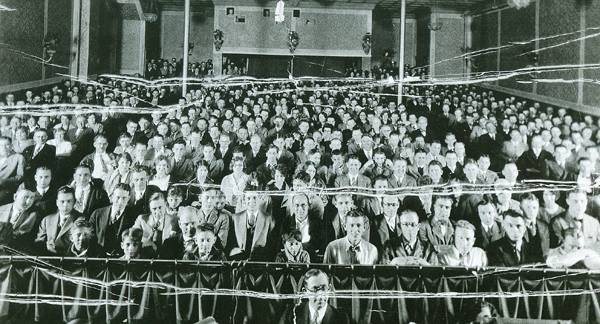Closing in Campustown

When it opened, the Varsity Theatre was packed, according to Lynn Lloyd, manager of Champlin Properties, but it closed in January 2009 due to decreased attendance. Courtesy photo: Lynn Lloyd
October 4, 2009
For decades, the Varsity Theatre, 2412 Lincoln Way, brought the latest films to students and community members.
When Cinemark closed the theatre in January, all of the seats, screens and other equipment were removed, and the building now stands empty, a testament to the changing face of Campustown.
Lynn Lloyd, who managed the theatre and other properties built by her grandfather, A.L. Champlin, said, often, people do not understand how a building in such a location could not succeed.
“They think, ‘wow, this must be a gold mine – it’s right across from 26,000 students,’” Lloyd said.
But Campustown is not what it used to be.
First came the construction of 13th Street, diverting traffic from Lincoln Way, which, at the time, was the primary east-west route through Ames.
Then came city buses and the relaxation of university rules about freshmen and sophomore students having cars at school, which allowed students to live anywhere in Ames.
When Knapp and Storms Halls, two of the towers residence buildings, were demolished in 2005, Campustown traffic decreased further.
Prior to that, the area was almost problematically busy.
“There was 2,500 students that would walk down Welch,” Lloyd said.
“It was so busy that they used to talk about putting archways across [Lincoln Way] because of traffic.”
Then the university got into the food-service business in a big way, meaning students had fewer reasons than ever to cross Lincoln Way, Lloyd said.
The result is a struggling district with empty buildings and extra work for the property managers trying to fill them.
“People don’t have the money to invest in new businesses,” Lloyd said.
“What you’re trying to do, as a land-owner or as a property manager, is just to keep who you have.”
That means cutting deals.
“I’m always having to cut rents considerably to keep people in their spaces,” Lloyd said.
Sometimes, even that doesn’t work.
“People often say when my tenants get behind in rent, ‘why don’t you just kick them out?’” Lloyd said.
“There’s nobody waiting in the wings to take over those positions.”
When a tenant does leave, it is often hard to find a steady one to take its place.
One of Champlain’s properties, 114 Welch Ave., has seen huge turnover, despite the fact that rent was offered at-cost.
“In the front space, we’ve had a hair place, we’ve had a restaurant … we just finished two years with a church,” Lloyd said.
“And we rented it at only the cost of the taxes. No rent at all.”
That said, the taxes themselves are somewhat hefty.
“The taxes on the properties in Campustown are some of the highest in Ames,” Lloyd said.
For example, yearly gross taxes for the Varsity Theatre in 2008 were $22,675.15, according to information from the Ames Assessors Office.
The assessment has been decreased for 2009, but now there’s no tenant and no rent to help pay the taxes.
According to Lloyd, the tax rates are based on the idea that Campustown has the University as an “anchor.”
“In years gone by, that was true,” Lloyd said. “But it’s not true now — [the university] is a competition, a huge competition.”
So the fate of the Varsity Theater, as well as other empty spaces in Campustown, remains uncertain.
Lloyd said she has had inquiries on the theatre, but most want to turn the space into the one thing the neighborhood doesn’t need — a bar.
“Every time another bar opens, it just takes the business from another bar,” Lloyd said.
And since two of her tenants — Headliner’s and Bali Satay — are in the bar business, it is almost as if Lloyd, as the property manager for the two, is in the bar business as well.
“We’ve got a bar on the corner now that has taken on a big expense. We want them to make it. Why would we put another one in?”
But despite the difficulties, Lloyd is hopeful that recent developments, such as the proposed intermodal transportation hub, will help turn the situation around.
Lloyd is not able to simply sell the buildings and get out.
Lloyd’s father, who still holds ownership of the properties, is not interested in selling a building that his father built.
“He refuses, at 91 years old, to consider anything but keeping it,” Lloyd said.






